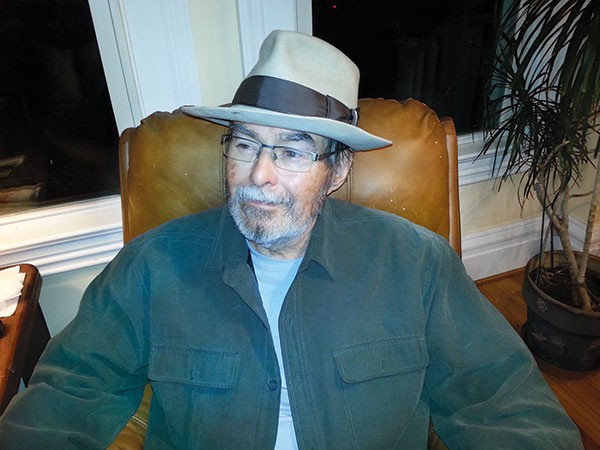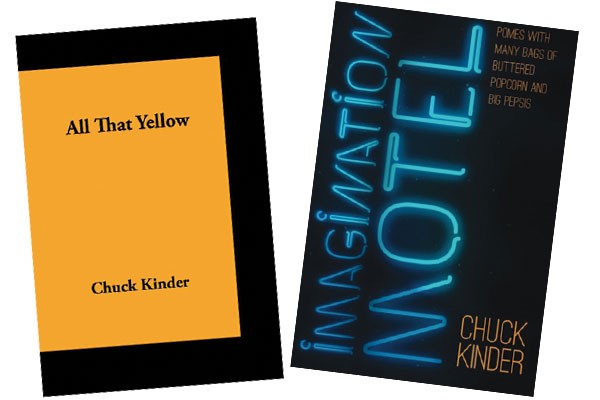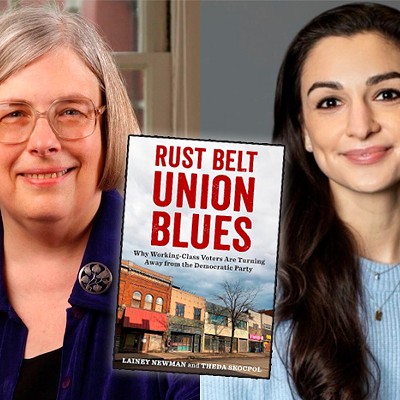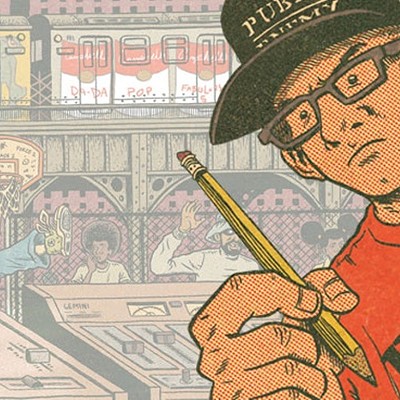At Pitt in the early '90s, classes taught by novelist Chuck Kinder carried legendary status among my fiction-writing friends. The raconteur in Kinder seems alive and well, as the self-proclaimed "aging hillbilly-hippy poet-type" recently released his first two collections of poetry, All That Yellow and Imagination Motel. While the books share similar versions of many of the same poems, work that seems most interested in keeping memories of youth's electricity alive, it's often the poems they don't share that are most interesting.
For a West Virginia native, raised mostly on "roadkill and rage," Kinder's life is fascinating for its intersection with some of America's brightest literary minds of recent decades. After graduating from West Virginia University, he hung with Richard Brautigan in San Francisco, then gained a prestigious Stegner Fellowship at Stanford in 1972, alongside future luminaries Raymond Carver and Scott Turow. He began teaching creative writing at Pitt in 1980 and at his house in Squirrel Hill held something of a boozy salon, where visiting writers like Tobias Wolff rubbed elbows with Kinder's students and others in the Pittsburgh writing community.
Adding to the allure, future Pulitzer Prize-winner Michael Chabon studied under Kinder, and made Kinder the basis for the Grady Tripp character in his 1995 novel Wonder Boys. It's been a whirlwind of a life for Kinder to reflect upon, as he retired from teaching this past spring and moved to Key West with his wife and "gun moll," Diane Cecily.
Kinder's own best-known work is Honeymooners: A Cautionary Tale, his roman a clef that recounts his adventures with Carver. It's been said the manuscript swelled to 3,000 pages before being heavily revised. With multiple health problems and age catching up, Kinder claims in interviews he was unable to maintain the energy necessary to write novels, and started focusing on his literary first love: poetry. Much of the work in All That Yellow and Imagination Motel is sprawling and memoir-ish, relying on a sometimes idiosyncratic, yet conversational, diction.
In "The Unbearable Mass and Beauty of Absence," readers are introduced to All That Yellow's main speaker, with Kinder writing, "Call me Charlie Trout / That is thanks to Richard Brautigan, or Troutbrain / as we called that bird back in the day / He is the character who determined I had the basic personality of a trout / Mostly bemused and beguiled easily ..." Trout is a speaker obsessed with "tragic hippy princess" Rainy McCall. Many of the poems that deal with her have a stoner's rambling, philosophical tone. That approach is also on display in Imagination Motel, where Kinder writes, "who is this Charlie Trout character? & who are ‘we'? / It is a very good question / we wonder ourselves / We all wandered vaguely West across America / To crash those Golden Gates into / The Age of Aquarius with flowers / in our hair ..." While the work in both books is honest, the reader, much like the speaker, doesn't always come out of these poems with clear answers, and maybe that's the point.
Kinder's experiments with different speakers are further seen in a series of ekphrastic poems, where he muses on life through the eyes of main characters in movies like Stagecoach, Tarzan and His Mate, High Sierra and Invasion of the Body Snatchers. They're worthy examples not only for cinema-history lessons, but also show how film cues insights about important moments of sexuality, love and betrayal in viewers' own lives.
One favorite, a list-y meditative series concerning the 1970 film The Molly Maguires, has his speaker remarking, "Poets give short answers / To questions / Poets cultivate an air of mystery / Poets pretend they have something / To hide / Which they do of course / Only not what they pretend / They do ..." It continues, "Finally, what poets seek is forgiveness / Even love, from those they betrayed ..." His clear-minded perspective on the candor that the art form often embraces, less rambling here than in other poems, is what gives poems like these their strength.
The use of metaphor in "The Old Sorcerer's Daughter" nicely sums both books as a coming-to-terms with love and loss. Kinder begins with, "I have been for a long time / In the motel of this poem / Where Rainy once was ..." and ends saying, "old motel remains open / & ready for business / Shining like a mirror / In the moonlight." Kinder's twin volumes act as a reliquary for times and people past.
















